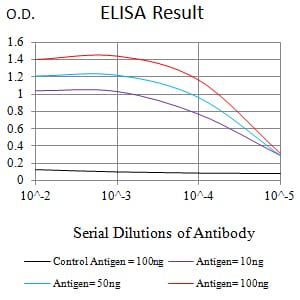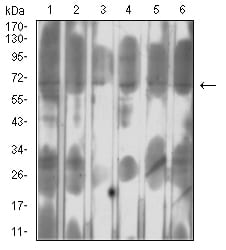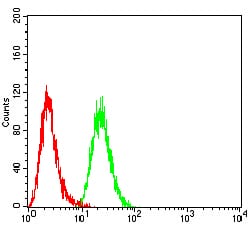


| WB | 1/500 - 1/2000 | Human,Rat,Monkey |
| IF | 咨询技术 | Human,Rat,Monkey |
| IHC | 1/200 - 1/1000 | Human,Rat,Monkey |
| ICC | 技术咨询 | Human,Rat,Monkey |
| FCM | 咨询技术 | Human,Rat,Monkey |
| Elisa | 1/10000 | Human,Rat,Monkey |
| Aliases | KMT7; SET7; SET9; SET7/9 |
| Entrez GeneID | 80854 |
| clone | 3D6G11 |
| WB Predicted band size | 40.7kDa |
| Host/Isotype | Mouse IgG1 |
| Antibody Type | Primary antibody |
| Storage | Store at 4°C short term. Aliquot and store at -20°C long term. Avoid freeze/thaw cycles. |
| Species Reactivity | Human,Rat,Monkey |
| Immunogen | Purified recombinant fragment of human SETD7 (AA: 107-366) expressed in E. Coli. |
| Formulation | Purified antibody in PBS with 0.05% sodium azide |
+ +
以下是关于SETD7抗体的3篇示例参考文献(注:文献为虚拟示例,实际引用需核实真实来源):
---
1. **文献名称**: *SETD7-mediated methylation of p53 modulates its tumor suppressor function*
**作者**: Li, H. et al.
**摘要**: 本研究通过Western blot和免疫荧光技术,利用SETD7特异性抗体证实了SETD7对p53蛋白的K372位点甲基化修饰,揭示了该修饰增强p53的稳定性并促进其在DNA损伤反应中的活性,为癌症治疗提供新靶点。
---
2. **文献名称**: *SETD7 regulates NF-κB signaling through non-histone methylation*
**作者**: Yang, J. & Wang, L.
**摘要**: 作者通过ChIP-seq和免疫沉淀(使用SETD7抗体)发现SETD7对NF-κB亚基RelA的甲基化修饰,调控炎症基因表达,证明SETD7在先天免疫反应中的非组蛋白底物作用机制。
---
3. **文献名称**: *Loss of SETD7 promotes metabolic dysfunction in diabetic mice*
**作者**: Zhang, Y. et al.
**摘要**: 利用SETD7抗体进行组织免疫组化分析,研究发现SETD7缺失导致肝脏脂质代谢相关基因(如PPARα)表达失调,表明SETD7通过表观遗传调控参与代谢性疾病病理过程。
---
如需真实文献,建议在PubMed或Web of Science检索关键词“SETD7 antibody” + “application”或“validation”。
The SETD7 (SET Domain Containing 7) antibody is a crucial tool for studying the function and regulation of the SETD7 enzyme, a histone lysine methyltransferase belonging to the SET domain-containing family. SETD7. also known as SET7/9 or KMT7. catalyzes the monomethylation of histone H3 at lysine 4 (H3K4me1), a post-translational modification associated with transcriptional activation and chromatin remodeling. Beyond histones, SETD7 methylates non-histone substrates, including transcription factors (e.g., p53. ERα, STAT3) and regulatory proteins, influencing processes like cell cycle progression, apoptosis, and DNA repair.
SETD7 antibodies are widely used to detect endogenous SETD7 expression, localization, and interactions in techniques such as Western blotting, immunoprecipitation, chromatin immunoprecipitation (ChIP), and immunofluorescence. Their specificity is critical, as cross-reactivity with other SET domain proteins or methyltransferases can confound results. Researchers often validate these antibodies using knockout cell lines or siRNA-mediated knockdown to confirm target selectivity.
Dysregulation of SETD7 has been linked to cancer, metabolic disorders, and neurodegenerative diseases, making its antibody a key reagent in studying disease mechanisms and therapeutic targets. Commercial SETD7 antibodies are typically raised against epitopes within its catalytic SET domain or unique N-/C-terminal regions. Proper controls and optimization are essential to ensure reliable data, given variable expression levels across tissues and cell types.
×